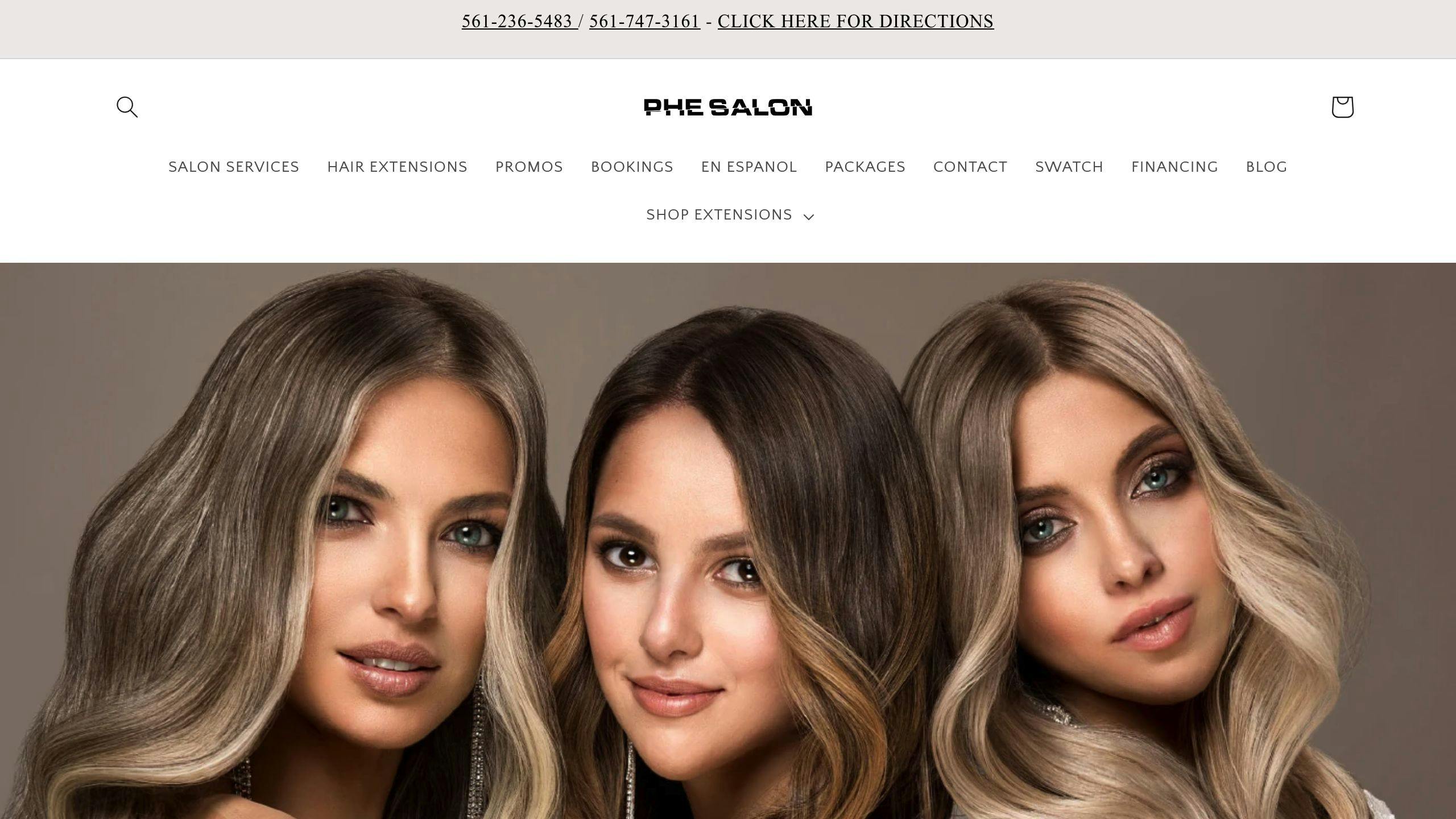Ethical hair sourcing ensures hair is collected with donor consent, fair payment, and transparency. Here's what you should know:
- Donor Consent: Hair is voluntarily donated or sold, often during cultural rituals like temple offerings in India.
- Fair Compensation: Donors receive payment that reflects the quality of their hair.
- Certifications: Labels like Fair Trade and ISO verify ethical and quality standards.
- Transparency: Brands share sourcing details, ensuring trust and accountability.
Why it matters: Ethical sourcing prevents exploitation, supports donor communities, and builds consumer trust. Look for certifications and ask brands about their practices to make informed choices.
How Hair Extensions Are Ethically Sourced: Step-by-Step
Step 1: Collecting Hair From Willing Donors
Hair is gathered from individuals who voluntarily choose to donate or sell their hair. In India, a large portion comes from temple tonsuring ceremonies, where people shave their heads as a spiritual offering [1]. Beyond these ceremonies, collection centers in areas like Europe and China work directly with donors to source hair responsibly.
These centers follow strict guidelines to ensure ethical practices:
| Requirement | Purpose |
|---|---|
| Documented Consent | Confirms the donor's agreement |
| Fair Compensation | Ensures payment matches hair quality |
| Identity Verification | Prevents unethical or fraudulent sourcing |
| Quality Assessment | Checks the condition of the hair |
Step 2: Cleaning and Processing the Hair
After collection, the hair goes through thorough cleaning and processing to ensure it meets high standards [3]. Technicians carefully inspect and clean the hair to remove impurities while maintaining its natural structure. The cuticle is preserved during treatment, which helps retain the hair's shine and durability.
Step 3: Verifying With Certifications
Once the hair passes quality checks, certifications are obtained to confirm ethical practices. Certifications such as Fair Trade and ISO ensure that the sourcing process is transparent, ethical, and meets quality standards [1][2]. These certifications focus on:
- Fair Trade Certification: Ensures donors are fairly compensated and treated ethically.
- ISO Certification: Confirms adherence to strict quality control measures.
- Transparent Labeling: Provides clear information about the hair's origin.
For example, salons like PHE Salon in Jupiter, Florida, work exclusively with suppliers who meet these standards. This approach gives clients confidence in the ethical sourcing of their hair extensions while promoting responsible practices across the industry.
Related video from YouTube
How to Verify Ethically Sourced Hair Extensions
Making sure your hair extensions come from ethical sources is a step toward supporting responsible practices and promoting trust in the industry. Here's how you can check their origins.
Evaluate Transparency and Reputation
When choosing brands or suppliers, pay attention to these factors:
| Factor to Check | Key Details to Assess |
|---|---|
| Sourcing Transparency | Proof of donor consent, fair compensation, and clear origin details |
| Production Standards | Explanation of processing methods and quality checks |
| Third-Party Verification | Independent audits or compliance certifications |
For example, PHE Salon in Jupiter, Florida, openly shares details about their suppliers and sourcing practices, helping customers make better-informed choices.
Look for Certifications
Certain certifications can confirm ethical practices:
- Fair Trade Certification: Guarantees fair pay and ethical treatment for workers.
- ISO Certification: Confirms high standards in processing and quality control.
Research Brand Credibility
To dig deeper into a brand's claims, try these steps:
- Check independent audits or third-party reports for authenticity.
- Reach out to brands or salons directly with your questions.
- Compare their ethical sourcing claims across websites, social media, and other platforms to ensure consistency.
sbb-itb-4220d4e
The Benefits of Ethical Sourcing
Ethical sourcing goes beyond just ensuring fair treatment for donors - it also creates advantages for consumers and helps improve industry practices.
Supporting Donor Communities
By fairly compensating hair donors, ethical sourcing contributes to local economies and helps communities grow. For example, companies like Atelier Extensions prioritize sourcing hair from Brazilian communities while adhering to strict ethical guidelines, showing their dedication to fair practices [2].
Building Trust With Consumers
When companies are transparent about their sourcing methods, it strengthens consumer trust. This transparency not only builds loyalty but also encourages customers to make more informed choices. Ethical practices often lead to lasting relationships with consumers and generate positive word-of-mouth.
Promoting Better Industry Standards
Rising interest in ethically sourced hair extensions pushes the industry to improve in areas like transparency, product quality, and worker protections. Businesses such as Remy New York highlight this shift by combining ethical sourcing with investments in the communities they work with [1][2].
Tips for Choosing Ethically Sourced Hair Extensions
As awareness around ethical sourcing grows, it’s important to make thoughtful decisions when picking hair extensions.
Check the Brand's Policies
Start by exploring the brand’s website for information about their sourcing practices. Look for details on:
- Transparent supply chains: Can you trace where the hair comes from?
- Fair treatment of donors: Are donors compensated fairly?
- Sustainability efforts: Does the brand show concern for the planet?
- Production methods: Are ethical standards upheld during manufacturing?
Ask Questions During Consultations
When visiting a salon or consulting a specialist, don’t hesitate to ask direct questions. Find out where the hair comes from, how donors are compensated, and how the quality of the extensions is maintained. Any reputable salon should provide clear and honest answers about their sourcing and quality practices.
Look for Salons Like PHE Salon in Jupiter, Florida

Some salons go above and beyond to ensure ethical sourcing. For example, PHE Salon in Jupiter, Florida offers both human organic and Remy hair options. They also provide free consultations, giving clients the chance to learn about their sourcing processes and tailor extensions to their needs.
When choosing a salon, focus on those that prioritize ethical sourcing alongside high-quality products. This often results in better extensions and happier customers.
Conclusion: Supporting Ethical Sourcing in Hair Extensions
Key Takeaways
The hair extension industry is changing by putting a spotlight on fairness, transparency, and better practices. Certifications like Fair Trade and ISO have become useful markers for identifying companies that follow responsible sourcing practices [1][2].
Notable progress includes:
- Fair pay and safer working conditions for donors and workers
- Clearer manufacturing processes, allowing consumers to make better-informed choices [1][2]
This progress gives consumers the tools to make choices that can influence the industry's direction.
How Consumers Can Drive Change
Consumers play a crucial role in shaping industry practices. By making informed decisions, they can encourage better labor conditions and responsible sourcing throughout the supply chain [2].
Here’s how to get started:
- Look into brands’ sourcing policies and certifications
- Open conversations with companies about their practices
- Support businesses that prioritize transparency
- Spread awareness about ethical sourcing [2][3]
For example, companies like Atelier Extensions have embraced direct sourcing methods that benefit both donors and their communities. Their work in Brazil, paired with in-house manufacturing, highlights how thoughtful purchasing decisions can uphold ethical standards while ensuring quality [2]. This growing collaboration between informed consumers and responsible businesses is driving meaningful improvements across the industry [1][2].

